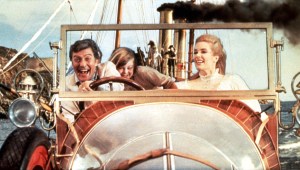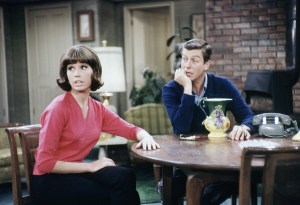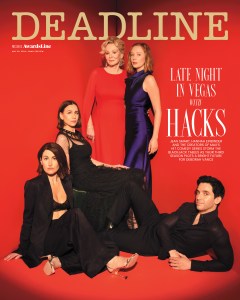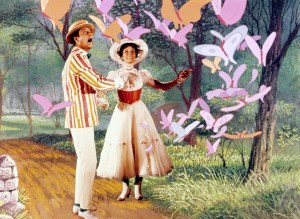Legend. Icon. Hero. Dick Van Dyke is unsure how to feel about these terms. “It’s a little hard for me to get my brain around that,” he says, speaking over Zoom from his home in Malibu. “I don’t see myself that way and I can’t comprehend myself as that.”
The 98-year-old has had some time to grapple with the idea. As the star of cultural touchstones from The Dick Van Dyke Show to Mary Poppins to Chitty Chitty Bang Bang to Diagnosis Murder, Van Dyke has been on screen for as long as almost everybody can remember. His received his first lifetime achievement award 30 years ago. The legend label is not new. Perhaps he struggles to accept it because it implies a finality, that your work is complete and you’re now a part of the past, not the present. Van Dyke does not consider himself done. “I’d still like to do a one man-show,” he says. “Cary Grant did it. And Gregory Peck. Went on the road and talked about their careers. I think it’d be fun.”
He certainly wouldn’t be short of material. Van Dyke has been working for more than 70 years now, across film, theater and TV. The biggest screen moments of his career were celebrated in the recent CBS special Dick Van Dyke 98 Years of Magic, a very sweet variety show involving heartfelt tributes and a parade of performers giving their takes on Van Dyke’s most famous musical numbers. The eclectic line-up ranges from Jason Alexander marching through Chitty Chitty Bang Bang to Rita Ora doing a spirited “Supercalifragilisticexpialidocious”. Throughout, Van Dyke, perched in a Chitty Chitty Bang Bang replica alongside his wife Arlene Silver, looks on, grinning from ear to ear, frequently singing along with gusto. His love for his work is, evidently, undimmed.
Dick Van Dyke and Julie Andrews in Mary Poppins.
Everett Collection
Dick Van Dyke never really planned for any of this to happen. He couldn’t have plotted a television career because television barely existed when he started out in the early 1940s. “I began at 17 as a radio announcer,” he says. “I got that job because the war was on and everybody was drafted. I was running a radio station every night by myself at that age.” He loved the job, and when television grew in popularity after the war, he thought “Well, I’ll be a television announcer.” He didn’t do that. Instead, he formed a comedy team, The Merry Mutes, with his friend Phil Erickson, which took him around the country, doing local live shows and television spots, and eventually landed him an audition at CBS, where he was signed to a seven-year contract. “They tried me as a game show host, a newsman—everything was a flop!” he laughs. “I was let go after three years and it was the best thing that ever happened to me, because I had to go out and look for work. I went to try out for every theater production going, and eventually happened to get the lead in Bye Bye Birdie.” That was in 1961. He won a Tony for the role and everything snowballed from there. By the end of the year he had his own hit sitcom, The Dick Van Dyke Show, which ran for five years and won him three Emmys. In 1965, along came Mary Poppins, then in 1968, Chitty Chitty Bang Bang. That trio alone would be enough to earn his place in the history books and in the hearts of generations of children.
He insists he’s never had any real drive and that his success has been pure kismet. But surely you don’t get the career he’s had without a strong sense of ambition? “Well, it was a matter of just enjoying myself,” he says. “I always loved what I was doing. If it had felt like work, I probably would have stopped it a long time ago,” he laughs, “but I just loved it.” When we discuss his work, he politely corrects the word. “I call it my play.”
It’s striking just how much of his career Van Dyke can easily recall. He says, “I can’t remember what I had for breakfast… but my long-term memory is only getting better.” He’s 18 months shy of 100 and is of course slower than he was. He sometimes struggles to recall names, and is occasionally prompted by his wife, who’s sitting alongside him, but the stories come easily. Ask about Chitty Chitty Bang Bang and he’ll launch into an anecdote about having to film the ‘English countryside’ scenes in France because the English summer was so wet. He’ll recall visiting Speakers’ Corner in London while filming Mary Poppins, to “hear all those soapbox orators”, and enquire whether they’re still there. It’s only on some of his more recent projects that his memory fails him. Asked what it was like to revisit the world of Mary Poppins for Mary Poppins Returns, in which he made a cameo riffing on his old man role from the original (the joke being that the senior citizen make-up was no longer required), he says, “I have to be honest, I can’t remember. I really can’t.” He sounds genuinely sorry not to be able to share a story.

Van Dyke and Sally Ann Howes in Chitty Chitty Bang Bang.
Everett Collection
Although he’s spent more than 50 years telling stories of his most popular movies, he never grows weary of it. “Nobody ever tires of talking about themselves,” he jokes. The only part he starts to find harder is that he’s one of the few left who can talk about his most beloved projects. Aside from Mary Poppins co-star Julie Andrews, almost all of his early collaborators have passed on.
“There is a kind of sadness in [watching 98 Years of Magic],” he says, “because all of the wonderful people that I loved and worked with over the years have gone. I realized I’ve outlived an entire generation… I miss Rose [Marie] and Morey [Amsterdam] and all the wonderful people I worked with over the years. They should have been there.” The loss of Carl Reiner, The Dick Van Dyke Show’s creator and Van Dyke’s dear friend, is the hardest for him to sit with. “I think I learned more from Carl Reiner than anyone else,” he says. “He understood comedy. He understood drama. He had a sense of timing like nobody else. And he was just so sharp and bright and a philosopher on top of it. He was the finest human being I ever knew.”
Van Dyke has always said he’ll never retire. And he means it. “I’ve just done my first soap opera!” he says excitedly of his guest spot in Days of Our Lives, for which he’s up for a Daytime Emmy. “Never done that before! I played an old guy, of course, in a wheelchair. My wife played my attendant.” And there are still those aforementioned ambitions to take a one-man show on the road.
This unwavering excitement about what’s to come is a large part of Van Dyke’s enduring charm. He is endlessly positive. He refuses to dwell on anything gloomy. Every bad thing that’s happened in his life is framed as a path to something better. In the past, when he’s talked about his struggles with alcoholism (he’s been sober for many years), it was generally a reason to talk about the strength of his family and his good fortune at coming out the other side. Asked if there’s anything that ever riles him, he pauses for quite some time. “Watching the news,” he offers. “Any time I turn on CNN.”

Van Dyke with Mary Tyler Moore on The Dick Van Dyke Show.
Zinn Arthur/TV Guide/Everett Collection
He does allow the slightest hint of regret that his dramatic work is not as recognised as his comedy. He mentions talking to a producer after 98 Years of Magic and saying, “‘You know, I did some dramatic movies. Why didn’t you show those?’ And he said, ‘Nobody wants to see you be serious!’” He laughs, but there’s a truth in it. He took dramatic roles, and in some cases, like the show Diagnosis Murder, which ran for seven years, they were big successes. Yet it will always be the comedies and musicals that will leap to people’s minds immediately on hearing his name. He’s just fine with that.

Read the digital edition of Deadline’s Emmy Comedy magazine here.
“You know, yesterday I was looking at Facebook,” he says, “and there was a video of a toddler in diapers trying to imitate me doing my dancing in Chitty Chitty Bang Bang. And he had the moves! I just almost cried. Sixty years later, a little baby trying to dance like me.” Moments like this are not rare for him. “I’m on my third generation now of kids who are writing to me. And I’m getting wonderful mail from their parents thanking me for providing good entertainment for their kids. They’re so kind about it. That I really appreciate. I’m so lucky.”
You can guarantee this won’t be the last generation to delight in his work. Even when Van Dyke is no longer around to receive the letters, and probably after most of us have gone too, there will still surely always be a toddler somewhere, impeded by their own diaper, trying to pull off their own version of a Dick Van Dyke dance.

